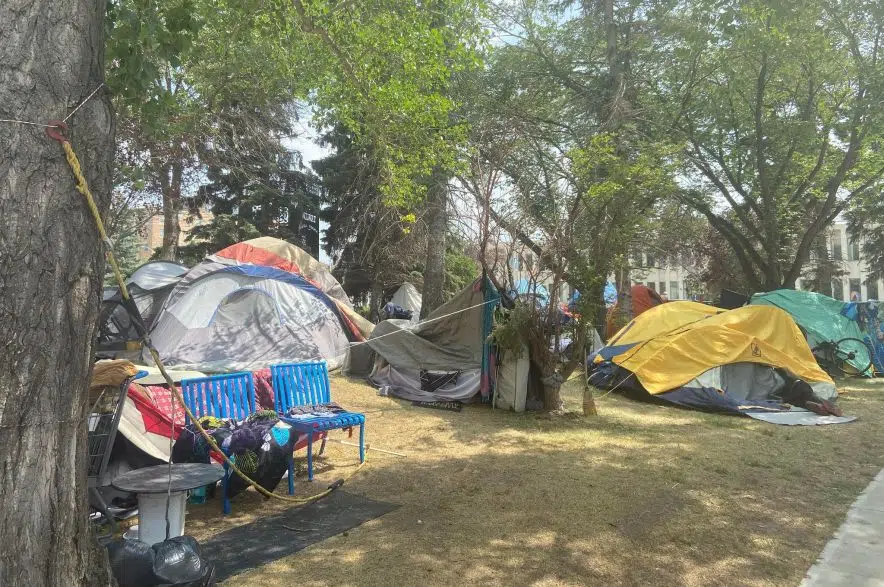The tent city that has been growing for more than a month outside Regina City Hall is in a state of mourning.
On Wednesday morning, a woman died from a suspected overdose.
“We’re all in a little bit of a shock. She was a close friend of mine,” said Kayla Mitton, a resident of the camp who goes by the name Pynk. “It hasn’t quite hit me yet.”
Pynk has been living at the encampment since Day 1. She has run out of options as she’s on a landlord blacklist.
She said her rent and utilities were always paid, grass was cut, flowers were planted and she even had a garden. Her kokum chimed in and agreed saying, “She kept a nice area.”
The problem wasn’t with bills, it was the company she kept.
“I have a big heart,” said Pynk.
She would invite houseless folks over to get them on their feet again, but sometimes they would destroy her place and get her in trouble.
She said if she gets a place of her own again, she will only allow her son and his father to stay.
“As much as it’s going to hurt me, I’m not going to invite anyone over,” she said.
She doesn’t want to leave the encampment fully, saying she enjoys living in a tent in the summer. But one day she does want her own house.
Pynk has a place to stay, but it’s with her ex-fiancé. She said if she’s staying there and not at the encampment, she can’t share her story and help educate others.
Finding shelter can be extremely difficult as most individuals suffering from houselessness also struggle with some sort of addiction and mental health issues. Without adequate resources to solve those problems first, the cycle continues.
“Some (of us) were just those youth that were dropped between the cracks of society and the government, forgotten about,” said Pynk. “We just need someone to put in a bit of effort. If everyone puts in that little bit of effort, it builds up and goes a long way.”
Pynk helps out around the camp in whatever way she can. She has hung up signs saying “Make poverty history.” She helps feed the individuals around her tent. One day she made over 200 smokies and sausages. She is also planning an art show for the beginning of August to showcase the many talented artists who live in the tent city.
She said living like this isn’t ideal. Every day is like hitting the reset button.
“Everyone deserves to have a home to call a safe space, where we can lay our heads in safety,” she said.
She wants everyone to remember we are all human at the end of the day, regardless of where you come from. There are complex layers and reasons as to why someone ends up where they are.
For houseless Indigenous folks, intergenerational trauma plays a big role.
“Come and get to know our story. Don’t judge us or profile us like you think you know us because you don’t,” she said.
Pynk wants there to be discussions and she wants them sooner rather than later.
She said she would be willing to talk with Mayor Sandra Masters about a solution.
“If she would actually sit down with me and one of my teammates, then maybe we’d be able to help her to help the rest of us,” said Pynk.
Pynk has been very open about talking with the media and getting an accurate perspective out there. She thinks her words can only do so much. Members of the public need to see for themselves what is going on.
“No matter how many words I spit out of my mouth, it won’t even amount to anything for the way I want to express and show what it’s like,” she said.
Volunteers doing what they can
After the apparent overdose Wednesday, volunteer Alejandra Cabrera said she and her colleagues are doing more wellness checks.
“People are being a lot more careful. They’re coming to the table asking for Narcan and Naloxone just to have at the tent if someone is using so that they can also administer it,” she said.
She has emailed Masters multiple times trying to arrange a conversation between her and members of the tent city, but she hasn’t heard back.
Cabrera isn’t surprised by the lack of response but said she won’t give up.
“A simple conversation; that’s all we’re asking for,” she said.
She mentioned comments made by Social Services Minister Gene Makowsky about help being offered to the camp but she said it has limitations.
The social workers are inside City Hall and cannot come outside unless they’re accompanied by a police officer. That pushes a lot of people away, creating a further divide.
“I don’t know if they’ll ever get around to doing actual work for people that are not in a privileged position,” she said.
Cabrera said creating discussions can go a long way. She wants the public to talk.
“Just come out and have some conversations with others and get an understanding of why they’re here,” she said. “We have a lot more in common with each other than politicians do. We need to stand together united in solidarity.”











